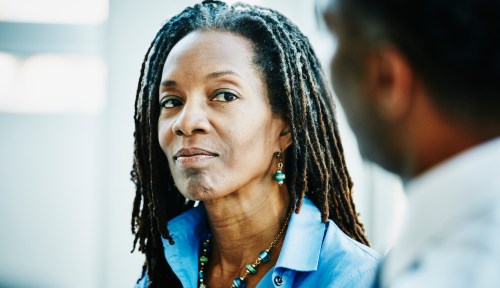Our editors independently select these products. Making a purchase through our links may earn Well+Good a commission
‘I’m an Aging Expert, and Here’s What People Get Wrong About Memory and Aging’
When you think of aging and memory, you might think it all gets worse as we get older. Here, learn why an aging expert says that's untrue.

When you can’t remember something that happened a few days ago, or you misplace your keys for the 10th time, someone might say that you’re having “a senior moment.” That may happen because they’ve watched a few TV shows featuring people in their 70s and 80s with cognitive decline, as opposed to seeing near-centenarians who are leading full and healthy lives. This messaging—that things inevitably deteriorate as you get older—contributes to a myth about aging and memory. While memory can worsen over time, it doesn’t necessarily have to. And here’s the tricky thing: If you feel confident that your memory will inevitably fade, you overlook the agency you have to prevent it from happening.
Experts in This Article
Becca Levy, PhD, is an aging expert as well as a professor of public health and psychology at Yale University.
Countless people believe that aging and memory have an inverse relationship—and there’s some truth to that. However, it’s wrong to assume that all memory inevitably worsens the older people get, says aging and anti-ageism expert Becca Levy, PhD, a professor of public health and psychology at Yale and the author of the forthcoming book Breaking the Age Code. Dr. Levy’s research focuses on psychosocial factors that influence older individuals’ cognitive and physical functioning and their influence on longevity. She says, to dispel the notion that aging and memory loss go hand in hand, it’s first essential to understand that there are different types of memory—and some of them actually get better with age.
Read on to learn about the different types of memory, how those change as we age, and Dr. Levy’s best tip for keeping your memory as sharp as possible.
4 types of memory and how they change with aging
Different types of memory are distinctly affected by aging. Some get worse, others improve, and others remain unchanged throughout life.
1. Procedural memory
Procedural memory involves remembering how to carry out tasks such as riding a bike, driving a car, or cooking your favorite meal. According to Dr. Levy and the American Psychological Association, procedural memory stays the same as we age. “Any kind of procedure that we can repeat over time, we tend to really hold on to,” says Dr. Levy.
2. Episodic memory
Episodic memory involves recalling that something happened on a given day. It tends to decrease as we age, says Dr. Levy. (Though it’s worth noting that this might be attributed to the number of new experiences we have each day.) Additionally, the APA states that episodic memory only “somewhat” declines over time.
3. Semantic memory
As the term (almost) suggests, semantic memory concerns general knowledge. Think: vocabulary, state capitals, and other facts you might whip out in a heated round of trivia at the bar. According to the APA, “semantic memory continues to improve for many older adults.” This makes sense because, as parents often say to children: When you get older, you know more.
4. Metacognition
Essentially, metacognition is thinking about what you’re thinking, says Dr. Levy. “There are some studies that show cognitive complexity tends to improve with later life,” she adds. For example, this study found that older adults can accurately assess their ability to remember information selectively.
Dr. Levy’s top tip for keeping a sharp memory as you get older
Multiple factors affect how people age—including what we eat, how much we exercise, and the beliefs we hold about aging—so it’s hard to make a blanket statement about what happens as we age, says Dr. Levy. That said, Dr. Levy’s research has found that people who have positive beliefs about aging are more likely to have better memory.
In one study, she categorized statements such as “Old people are absent-minded” and “Old people cannot concentrate well” as negative age beliefs. Dr. Levy randomly assigned different age beliefs to people to determine how their memory might change before and after “activating” the age stereotypes. Her team found that older people showed better memory performance if they activated positive age beliefs (like being optimistic about getting older). “For a psychological mechanism, you could see that a positive age belief could lead to greater self-efficacy or a greater sense of being driven to carry something out,” says Dr. Levy. (Because #optimism.)
While myths about aging and memory are all too common, knowing how memory works can help you strengthen yours. And, if longevity is on your well-being list, you’ll stand to benefit from adopting positive aging beliefs to truly live your best life.
Oh hi! You look like someone who loves free workouts, discounts for cutting-edge wellness brands, and exclusive Well+Good content. Sign up for Well+, our online community of wellness insiders, and unlock your rewards instantly.










